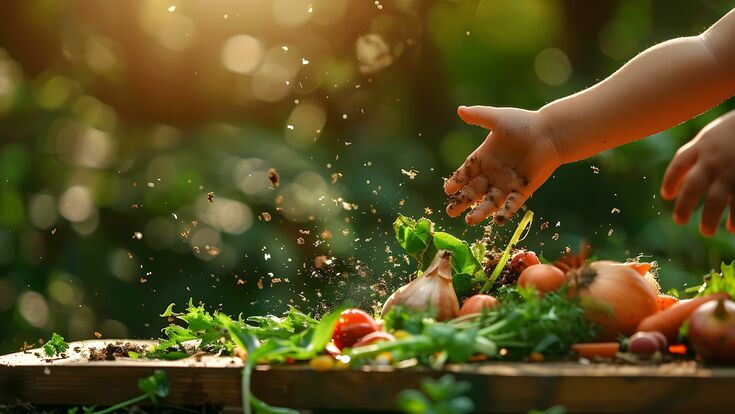International Compost Awareness Week : Nature's Climate Champion: Compost

At a time when the world is grappling with the urgent need to tackle climate change, International Compost Awareness Week (ICAW) is a beacon of hope, celebrating compost and the importance of recycling organic matter. From 5-11 May, individuals, communities and organisations around the world unite to raise awareness of the transformative power of compost and composting to mitigate climate change.
ICAW is organised by the International Compost Alliance, comprised of member organisations from all over the world. The aim of the Alliance is for organic recycling organisations around the world to work together to maximise the recycling of organic waste and promote the production of certified, high-quality compost for the benefit of the environment, society and our members.
This year's theme, COMPOST... Nature's Climate Champion, emphasises the very real fact that we can still fight climate change rather than accept it as a given. By recycling organic matter and returning compost to our soils, greenhouse gas emissions can be reduced and added benefits such as improved soil health and biodiversity, enhanced agricultural productivity, improved food security and water quality can be achieved.
Related article: Why - and how - biowaste should be collected separately
Fighting climate change
Over 83 million tonnes of organic waste is recycled worldwide each year.Not only does this recycle over 1 million tonnes of plant macro-nutrients, but by sequestering carbon in the soil and offsetting the use of fertiliser, it reduces greenhouse gas emissions by 9 million tonnes of carbon dioxide equivalent - the equivalent of driving an average car 36 billion kilometres (23 billion miles); almost 95,000 times the distance between the Earth and the Moon!
The annual potential could be more than 12 times greater if all of the world's unavoidable organic waste were collected separately and composted.
"Compost is a powerful champion in our fight against climate change," remarked Stefanie Siebert, Executive Director of the European Compost Network ECN. "It not only reduces methane emissions from landfills but also enriches soil, sequesters carbon and promotes greater biodiversity. Through International Compost Awareness Week, we aim to highlight the immense potential of composting and compost as nature-based solutions to combat climate change."
Composted organic matter helps our soils absorb carbon dioxide from the atmosphere and lock it into the soil, where it can remain for years, decades or even centuries. Simultaneously, compost helps create healthier soils that are more resilient to changing weather conditions, improves soil structure and water-holding capacity, and reduces erosion. By providing plants with a slow-release source of nutrients and healthier soils, compost also helps to reduce the need for chemical fertilisers and pesticides.
"As we confront the challenges of a rapidly changing climate, composting emerges as a tangible and accessible solution that empowers individuals and communities to take meaningful action," said Stefanie Siebert, Executive Director at ECN. "International Compost Awareness Week serves as a catalyst for change, inspiring collective action towards a more sustainable future.". We encourage everyone to participate in ICAW and learn more about how composting can benefit our communities and the environment."
To mark ICAW, communities and organisations around the world are hosting composting workshops, demonstrations and many other types of events. Even individuals can get involved by starting their own composting system at home or in their community, learning about the important workings of a local composting facility, and adding compost to their soil to improve their garden's productivity and climate resilience. You can find information about local events here.

